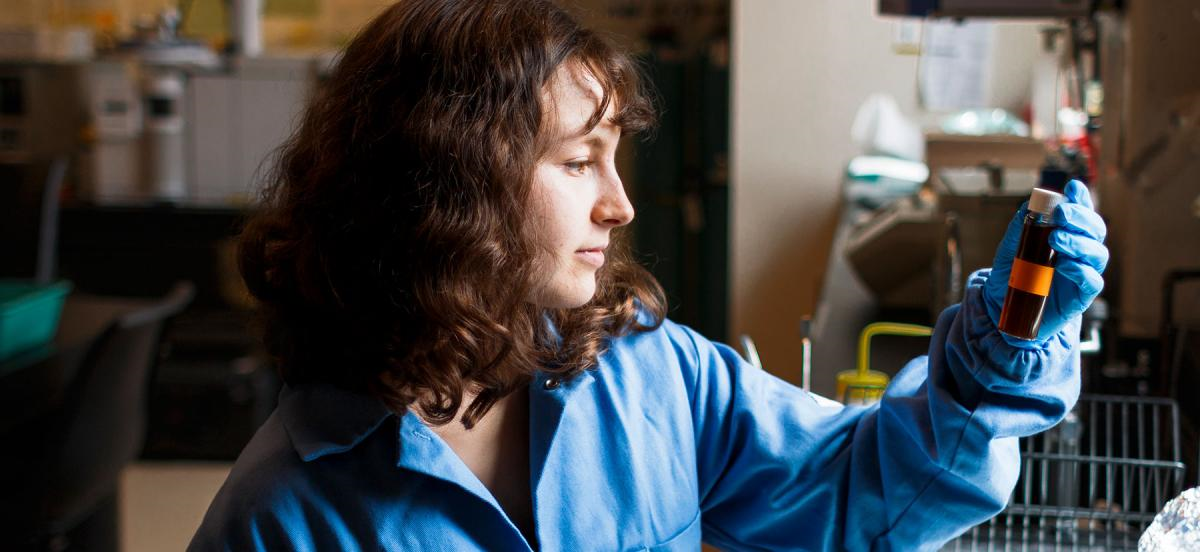Students aren’t waiting for grad school to do hands-on research
By Stephanie Widzowski
Emma Bullock, a Haverford senior, has a full plate. She takes physics, advanced German, and multiple high-level chemistry courses at a time. She gets up early to run and sings in an a cappella group of which she’s been a member since freshman year. She spends long evenings in the lab, but it’s not for classes. Bullock does research, a chance many undergraduates get to solve intriguing questions or help them get into graduate school.

Emma Bullock does research on bees
The number of Americans going to college, including grad school, has increased steadily over the past few decades, according to the National Center for Education Statistics.
With higher enrollment comes opportunities for STEM undergrads at four-year schools to do research. Often all it takes to get involved is asking a professor if they need help with a project.
Bullock studies the health of honeybees and whether chemicals in their bodies can show disease. She hopes to find a cheap, easy way for beekeepers to check on their hives. She started as a sophomore on a senior’s project and has made it her own.
“So, what I did was I took the methods that I worked with her to develop, and just worked individually my junior year to do them,” said Bullock. Her adviser Helen White steps in if something is confusing, but otherwise, Bullock adds, “You’re on your own.”
This might sound scary, but it seems to foster independence.
Junior Lily Bennett studies conifers with biology professor Jon Wilson, and senior Divesh Otwani develops new ways to write computer programs with a professor at Bryn Mawr. Both attest to the freedom and confidence their work gives them.
Research is also a chance to get to know a professor on a deep level. Mentors can also help students get more out of the learning process.
“[Jon] helps me analyze my data and suggests readings for me,” Bennett wrote. “I honestly can’t speak highly enough of Jon, though. He’s really the best.”

Haverford Student Lily Bennett
These three students do research on top of their coursework. How do they balance it all?
“So it can be tough, but Jon is flexible with when I get things done, so long as I get the work done,” Bennett wrote.
Bullock just laughed. “I had no choice,” she said.
But she never compromises on her health. “I have a very strong philosophy that if you don’t get enough sleep, you can’t do anything,” she added. “So I basically did not have any spare time my junior year. I did nothing except work.”
The stress visibly affected Bullock, who stared straight ahead recounting all the work she had done last year. The chemistry department at Haverford is notoriously rigorous: multiple classes give 24-hour exams, and many students have admitted taking 16 hours or more on them.
Research may have advantages for those pursuing grad school, but combined with the stress of classes, it may not be worth the effort.
“I’m not sure how I did it,” Otwani wrote. “It does cut into socialization and I was completely burned out by the end of last year.”
Bullock thinks there is an expectation at Haverford that students do research, something she doesn’t see with her friends at other colleges. It is unclear whether this expectation is hurting more than it is helping.
Haverford does make research more accessible in some ways: in some departments, students can choose whether to get credit or pay for their work. This levels the playing field for low-income students. It knocks out two birds with one stone: gaining experience in the field and paying tuition costs.
“I especially think being able to be paid in your junior year for it is good because otherwise … I would have another job and I would not have had time,” Bullock said.
Part of the pressure on students to do research comes from outside of Haverford.
For Bennett, it’s grad schools that put pressure on students, specifically those going into medicine or research science.
“I am planning on attending graduate school for something related to agricultural diseases, so I know I need research experience,” she wrote. “This expectation is fine, since I want a career doing research.”
Grad schools are incredibly competitive, much more focused on research, and usually programs are much smaller than at undergrad schools like Haverford. With more people seeking Masters or Doctorate degrees, schools look for anything on applications to decide which students will be most successful.
Research experience can help with the application, but the senior thesis goes a long way towards grad school, too. And as Otwani points out, not everyone in STEM fields will do research in their careers.
“It seems to me that STEM fields are largely about cool applications and uses of science and this doesn’t require research,” he said.
There are plenty of career paths STEM majors can take after graduation that don’t require working in a lab. Science communication, policy, and outreach are three critical areas, and students can combine their majors with their non-STEM passions to make their own way.
Either way, for better or for worse, doing research in undergraduate school is a learning experience.
